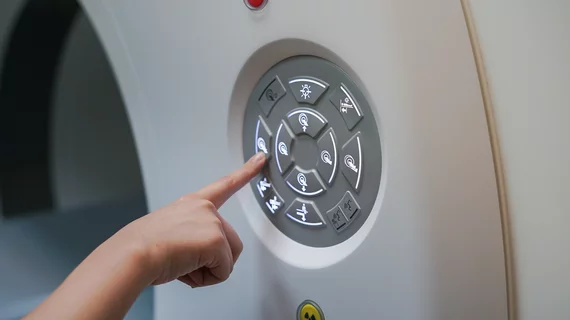Combined imaging technique pushes field closer to standard 5-minute knee MRI exams
Magnetic resonance imaging has historically been limited by its lengthy exam time. But a new technique hopes to make five minute MRI the new normal for knee imaging, according to a study published Tuesday.
Parallel and simultaneous multi-slice imaging are typically used independently to speed up image acquisitions. By combining these two approaches, however, experts created a new, faster knee MRI protocol that doesn’t sacrifice image resolution or quality, they reported April 6 in Radiology.
And when compared to a current 10-minute clinical parallel imaging technique, the five-minute approach proved to be quite accurate.
In an editorial accompanying this research, one Cleveland Clinic physician went as far as to say combined SMS-PI offers the “most promising path” to shorter knee scans.
“This study brings us one step closer to establishing a new normal: the five-minute knee MRI,” Naveen Subhas, MD, with Cleveland Clinic’s Imaging Institute, wrote on Tuesday.
Simultaneous multi-slice imaging and parallel acquisition, when used separately, yield an acceleration factor of two. Together, the pair increase that factor to four. And the authors of this study hypothesized this novel five-sequence, SMS-PI, 2D-turbo spin-echo knee MRI would perform similarly to their two-fold PI-accelerated 10-minute scan.
So, Filippo Del Grande, of Johns Hopkins radiology department, and colleagues tested both protocols among 252 adults with painful knee conditions. Participants underwent both five- and 10-minute knee scans at either 1.5 Tesla or 3T MRI between April 2018 and October 2019.
Three radiologists independently evaluated the exams, and their diagnoses were largely similar when analyzing meniscal tears, cruciate and collateral ligament tears, cartilage defects, and other abnormalities between the two protocols.
Subhas noted that SMS acceleration for turbo spin-echo sequences is still new and currently only offered by one major vendor. This factor, along with others mentioned in the editorial, will certainly influence whether five-minute MRI exams are widely adopted into clinical practice.
“Despite these obstacles, the combined SMS-PI technique presented in this study provides the most promising path to a five-minute knee MRI to date,” Subhas added.

